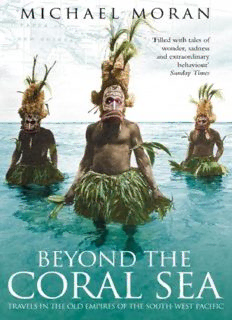
Beyond the Coral Sea: Travels in the Old Empires of the South-West Pacific PDF
Preview Beyond the Coral Sea: Travels in the Old Empires of the South-West Pacific
BEYOND THE CORAL SEA Travels in the old Empires of the South-West Pacific MICHAEL MORAN Dedication For my mother who saw this voyage begin but not end and the children of Papua New Guinea so full of energy and eternal delight Epigraph I have always thought the situation of a Traveller singularly hard. If he tells nothing that is uncommon he must be a stupid fellow to have gone so far, and brought home so little; and if he does, why – it is hum – aya – a tap of the Chin; – and – ‘He’s a Traveller.’ WILLIAM WALES Astronomer and Meteorologist Captain Cook’s Second Voyage in the Resolution Journal 13 May, 1774 Contents Cover Title Page Dedication Epigraph Maps Prologue 1 Forsaking Pudding Island 2 The Eye of the Eagle 3 ‘No More ’Um Kaiser, God Save ’Um King’ 4 Death is Lighter than a Feather 5 Too Hard a Country for Soft Drinks 6 ‘Mr Hallows Plays No Cricket. He’s Leaving on the Next Boat.’ 7 Constitutional Crisis in Makamaka 8 ‘O Maklai, O Maklai!’ or The Archipelago of Contented People 9 Kolonialpolitik Defeats the Man from the Moon 10 Minotaurs on Gilded Couches 11 Feverish Nightmares 12 Grand Opening – Tsoi Island General Store 13 An Account of the Criminal Excesses of Charles Bonaventure du Breil 14 ‘In Loveing Memory’ 15 ‘The Sick Man Goes Down with the Plane’ 16 ‘Rabaul i blow up!’ 17 Queen Emma 18 A Moveable Feast 19 ‘No Trespassing Except By Request’ 20 Auf Wiedersehn, Kannibalen 21 Under the Mosquito Net in Malinowski’s Tent 22 Farewell to That Strange and Fatal Glamour Epilogue Afterword Brief Chronology of Significant Historical Events in Papua New Guinea Bibliography of Principal Sources Index Acknowledgements Author’s Note About the Author Copyright About the Publisher Maps Prologue ‘If you dress well, they won’t eat you!’ Wallace said. He shuffled the cards with the stump of his right arm, beginning another interminable game of patience. The light was failing, the atmosphere oppressively hot and humid as the cards flapped on the bare table. Local boys glanced in darkly as they passed the flyblown screens covering the louvred windows. They were interested in the visitor and craned for a better view. A wretched poster of Bill Clinton greeting King Harald V of Norway hung at a crazy angle from the flaking wall. ‘We thought you were Gods.’ His rippling, grey hair caught the sun and he smiled, teeth showing the past ravages of chewing betel nut. Wallace Andrew was a distinguished personage with a heart of gold. This virtue had brought him many misfortunes in life. He began to hum the hymn ‘All Things Bright and Beautiful’. ‘Such a lovely tune, don’t you think? Young people today have abandoned proper hymns.’ The ceiling fan was motionless, the air thick and still. A pretty village woman with an ancient profile began to hurriedly set the table for dinner, laying out cutlery, bananas, pineapple and some lurid green cordial in a glass jug. She covered it with mesh. Malarial mosquitoes had already begun to ride the last shafts of sunlight in the dusk. ‘Napoleon will be here at seven. They will come directly from the chamber and then go out again,’ she said in excellent English, clearly for my benefit. They generally spoke the Suau language in the islands around Milne Bay in Eastern Papua New Guinea. ‘Fine men. Like my grandfather, a fine man,’ Wallace noted sadly, another fast game of patience in progress in the gloom. He adopted a consistently high moral tone in all his conversations and talked often of selfless Christians. ‘Charles Abel, one of the first English missionaries, always wore a bow tie, white shoes, starched shirt and trousers. He was never kai kai’d1 because they respected him. His wife came from England too. She delivered a village baby after they landed and her white dress was soon covered in blood. They didn’t eat her. She helped them.’ Wallace was, after all, the grandson of a cannibal and an expert on matters of
Description: